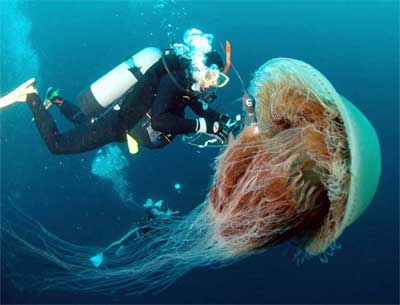Zwei Tiere
A reader sent me this gorgeous picture of a diver attaching a sensor to a jellyfish in the Sea of Japan.

Just a thought…which of the two animals in the foreground is more complex, better adapted to its environment, more "highly evolved", more successful? If we had a time machine and could peek into the seas 10 million years ago or 10 million years from now, which kind (neither specific species would exist, probably, but which general or related form) of animal would you be more likely to find?
Trackback url: http://tangledbank.net/index/trackback/3683/



PZ, you need to define what a 'kind' is! ;)
Still, three quarters of a billion years says I should bank on the 'jellyfish kind' being around for the next 10 million.